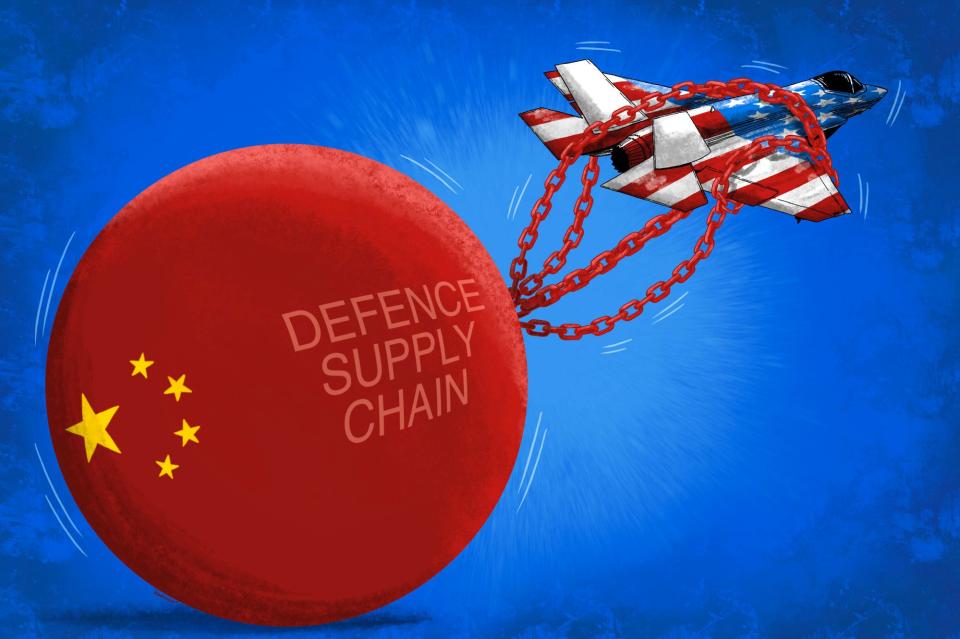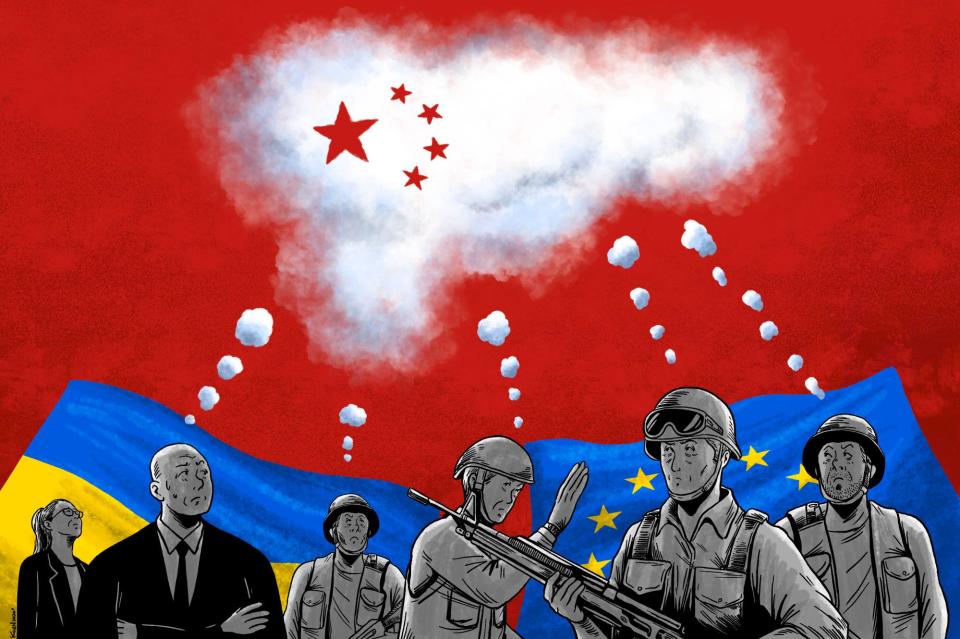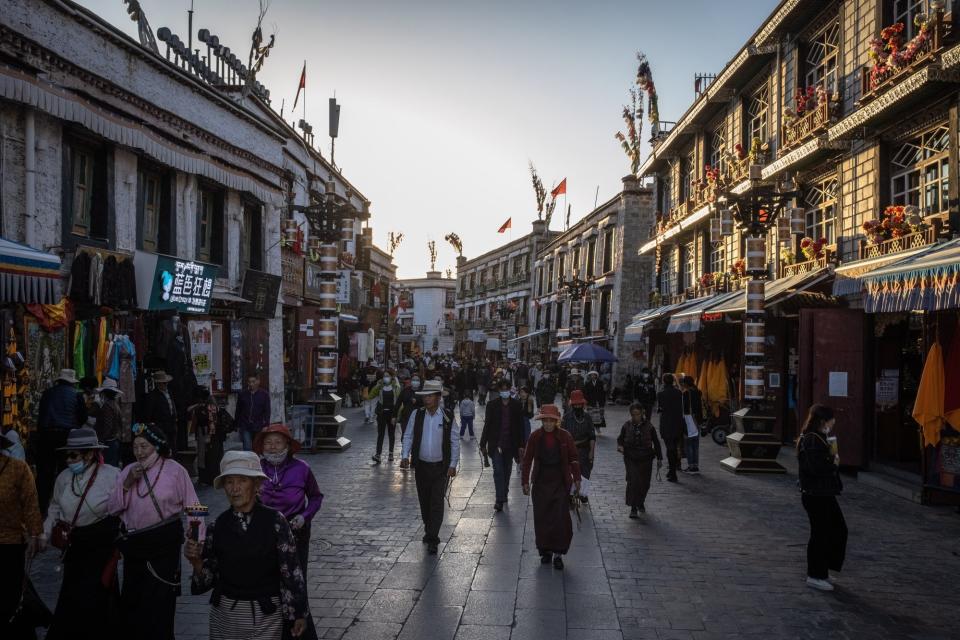Joe Biden forging ahead with efforts to counter China as Donald Trump, election loom large
We're little more than four months away from the US election, and with two wars raging and geopolitical alliances shifting, the mental acuity of the two main White House contenders has become a subject worthy of global attention.
While some point to US President Joe Biden's gaffes, moments of confusion and persistent inconsistencies over Washington's position with respect to the defence of Taiwan as evidence of mental decline, he has still forged ahead with efforts to strengthen partnerships and establish new ones.
Do you have questions about the biggest topics and trends from around the world? Get the answers with SCMP Knowledge, our new platform of curated content with explainers, FAQs, analyses and infographics brought to you by our award-winning team.
Meanwhile, the possibility of a second Donald Trump administration has many US allies and partners mulling independent policies to be prepared for possible abrupt shifts in positions on the South China Sea, the Korean peninsula and Ukraine from the Oval Office, according to some analysts.
Washington's stronger ties with India were on full display this month, when US national security adviser Jake Sullivan and deputy secretary of state Kurt Campbell went to New Delhi.
The visit underscored a deepening of bilateral ties that would not have been possible without the many strains in New Delhi's relations with Beijing in recent years, and was followed by another visit to the country by US lawmakers that drew the Chinese government's ire.
A bipartisan delegation, including Representative Nancy Pelosi, the former House speaker, and Representative Michael McCaul, the Texas Republican who is chairman of the House Foreign Affairs Committee, arrived in Dharamsala to meet with the exiled Tibetan spiritual leader, the Dalai Lama.
That trip prompted Beijing to warn of "resolute measures" if Washington fails to honour its commitment to recognise Tibet as part of China. That threat that may turn into action in response to a US bill seeking to counter Beijing's narrative on Tibet, which will head to Biden's desk for ratification.
There is little domestic political risk for Biden in signing the legislation, given the results of a recent Pew Research Centre survey showing that roughly four-fifths of Americans have an unfavourable view of China and an increasing number see the country as an enemy.
And despite diplomatic missteps like Biden's "xenophobia" comment, criticism in the US over Modi's record on democracy and human rights and an assassination attempt on US soil, analysts say, India needs Washington because China remains a unifying force for the two countries.
India aside, Biden has made significant progress in pushing other allies and partners to follow his administration's lead in countering China, a task that has become easier as concern spreads over China's surging trade with Russia and its role in prolonging Moscow's war against Ukraine.
That concern has risen to the top of the Group of 7's agenda. In a meeting last week on countering Chinese industrial overcapacity, "unfair" state subsidies and state-led dominance of strategic industries, G7 leaders vowed to take joint action against Chinese financial institutions boosting Russia's wartime economy.
Discussions over similar action by Nato are likely to dominate a meeting of the security alliance, scheduled for next month in Washington.
Nato Secretary General Jens Stoltenberg said during a visit to Washington last week that China's support for Russia's efforts in Ukraine has made it necessary for the bloc to forge global partnerships, particularly in the Indo-Pacific, and significantly ramp up defence spending.
Beijing's position has intensified the largest armed conflict in Europe since the end of World War II, Stoltenberg explained, saying the allies have been spurred to act and "impose a cost".
Such posturing, however, has not cowed Russian President Vladimir Putin, who last week signed a mutual defence agreement with North Korea's Kim Jong-un that formalised their alliance. Putin called the deal "a breakthrough document," while Kim called it the "strongest ever treaty" signed between the countries.
Also concerning for Washington policymakers was Putin's next stop - Hanoi, where the restarting of arms trade with Vietnam was expected to be high on the agenda.
True to form, Putin hinted while in Vietnam that he may revise his government's doctrine on the use of nuclear weapons. His comment coincided with a demand by Ohio Representative Mike Turner, chair of the House Intelligence Committee, that the Biden administration publicise its intelligence on Russia's nuclear capabilities.
But despite whatever advances Putin and Xi Jinping have made, Biden still appears to have the upper hand in terms of alliances, formal or otherwise, in the Indo-Pacific.
An inaugural trilateral summit in Washington between the leaders of the Philippines, the United States and Japan saw a number of announcements focused on strengthening maritime defence cooperation in the South China Sea to counter Beijing's increasingly aggressive actions in the disputed waters.
Meeting with Japanese Prime Minister Fumio Kishida and Philippine President Ferdinand Marcos Jnr at the White House in April, Biden said their trilateral summit represented a "new era of a partnership" designed to show strong support for the Philippines as it comes under growing pressure from China.
On the same front, Philippine defence secretary Gilberto Teodoro said last month that there is a "very strong possibility" for his country and Japan to sign an agreement allowing their defence forces to train in each other's territories during a meeting involving the two nations' foreign and defence ministers in July.
The US-Japan-Philippines partnership also follows a host of military, diplomatic, education and technology measures announced by Biden, Kishida and South Korean President Yoon Suk-yeol last year. While those agreements stopped well short of a formal alliance or the sort of collective defence commitment seen in Nato's binding Article 5, they sent a clear signal that the three would do far more in times of crisis than "consult", the language outlined in the summit joint statement.
But not all of Biden's efforts to build alliances to China's detriment are working out as planned. Hopes for a trade deal within Biden's Indo-Pacific Economic Framework for Prosperity (IPEF) were dashed when US Treasury Secretary Janet Yellen acknowledged that a trade deal within IPEF - the knottiest of the framework's four pillars - was mired in political infighting.
Against a background of scepticism towards how much Biden will be able to turn IPEF into an effective means to bolster economic integration with China's neighbours, more voices in Washington are also calling for the US to join the Asia-Pacific trade bloc which Trump walked away from as one of his first official acts in office in 2017.
In a book released this month, Robert Blackwill, a senior fellow at the Council on Foreign Relations, and Richard Fontaine, the president of the Centre for a New American Security, pushed joining the Comprehensive and Progressive Trans-Pacific Partnership (CPTPP) as one of several moves needed to strengthen the "pivot to Asia".
The authors, both of whom worked in the George W. Bush administration, join other voices calling for closer economic engagement with China's neighbours.
A report by the Asia Society Policy Institute last year, which was largely critical of Biden's Indo-Pacific Economic Framework, calls for options, including joining a "reimagined" CPTPP to update and renegotiate core areas of the agreement.
Joe Biden must publicise Russian nuclear threat to avoid 'day zero': US lawmaker.
US lawmakers meeting Modi after Dalai Lama signals New Delhi shift on China: analysts.
China says US tip led to suspect in 'prime example' of cooperation amid fentanyl crisis.
Opinion: China and neighbours can be more friendly to shield Asia from dangerous Trump 2.0.
US warns China to halt exports that support Russia or face 'further steps'.
Former NDRC official calls for improved dialogue between China and the West.
Series: Spotlight on China's military development.
US urged to join Asia-Pacific trade group, shift European forces to Indo-Pacific.
China support for Russia in Ukraine compels Nato to seek Asian partnerships: top official.

Illustration: Lau Ka-kuen alt=Illustration: Lau Ka-kuen>
What happens if the US cuts China out of its military supplies?
China's key role in global supply chains means it will be a real challenge to stop using all the materials and components it produces to make weapons
China's central role in the global supply chain has prompted the United States to initiate a series of measures to de-risk its relationship with the world's second largest economy as relations worsen.

Illustration: Lau Ka-kuen alt=Illustration: Lau Ka-kuen>
US military still has an edge, but China is catching up with hi-tech weapons
Analysts say PLA is narrowing gap with drones and hypersonic missiles, but Washington's growing alliances could help it maintain advantage
While China and the United States work to restore defence communication channels, the growing military might of the two powers has intensified tensions in the Asia-Pacific, most notably in the Taiwan Strait and the South China Sea.

Illustration: Lau Ka-kuen alt=Illustration: Lau Ka-kuen>
China lacks an advanced bomber. Can the H-20 'Water' quench its need?
'A new generation of equipment would bring a new generation of combat power,' PLA Air Force deputy commander says of mystery project
China's H-20 bomber is nicknamed the "Water", and it may just be the quenching solution the country seeks as it anticipates its next generation of strategic power.

Illustration: Lau Ka-kuen alt=Illustration: Lau Ka-kuen>
Could China strangle Europe's weapons output with cotton?
Europe has complained about China's supply of nitrocellulose, known as guncotton, but experts say Europe would rather not ramp up production
In early May, a chemical plant in China's central Hubei province exploded, killing three people. The culprit was nitrocellulose, a highly flammable material made from cotton. The plant belonged to Hubei Xuefei Chemical, China's second largest producer of nitrocellulose.

Photo: AFP alt=Photo: AFP>
With trade tensions rising, analysts advise China to keep cautious on exports
As the EU and US ready new tariffs on Chinese goods, analysts have suggested a careful approach to exports at a recent forum in Beijing
China's reliance on exports presents a potential pitfall for economic growth this year as uncertainties multiply over trade conflicts with the US and Europe, analysts said at a forum held at Renmin University of China in Beijing on Wednesday.
Gross domestic product growth of 5.3 per cent was reported in the first quarter - beating expectations - but data from May revealed some lingering jitters. Exports and new energy investment were bright spots for the world's second-largest economy last month, with consumption and the property market remaining weak links.

Photo: EPA-EFE alt=Photo: EPA-EFE>
Washington's new Tibet policy bill 'likely to be counterproductive'
Bill that seeks to counter China's narrative is expected to provoke 'very strong' reaction from Beijing
A new Tibet policy bill passed in the United States last week is set to fuel fresh tensions with China, with one analyst saying it could be counterproductive.
The US House of Representatives on Wednesday approved the Promoting a Resolution to the Tibet-China Dispute Act, which would channel funds to boost Washington's support for Tibet and counter what it calls "disinformation" from China about the region's history, people and institutions.

Photo: Reuters alt=Photo: Reuters>
Bridgewater's Dalio urges portfolio diversity amid US-China rivalry
Billionaire investor says US, China face 'big domestic challenging circumstances that could cause instability'
Billionaire investor Ray Dalio, founder of the world's largest hedge fund Bridgewater Associates, has warned that the US and China will continue to "press up against the other's red lines" as the US election nears, and smart money should prepare for heightened volatility by diversifying investments.
The two great powers are "on the brink of a much worse economic or military war" but neither wants to cross that line, as a major deterioration from current conditions could be disastrous, Dalio said in exclusive comments made to the Post. This strained but contained rivalry is set to pose major risks for global investors, he added.
Global Impact is a weekly curated newsletter featuring a news topic originating in China with a significant macro impact for our newsreaders around the world.
Sign up now!
This article originally appeared in the South China Morning Post (SCMP), the most authoritative voice reporting on China and Asia for more than a century. For more SCMP stories, please explore the SCMP app or visit the SCMP's Facebook and Twitter pages. Copyright © 2024 South China Morning Post Publishers Ltd. All rights reserved.
Copyright (c) 2024. South China Morning Post Publishers Ltd. All rights reserved.

 Yahoo Finance
Yahoo Finance 